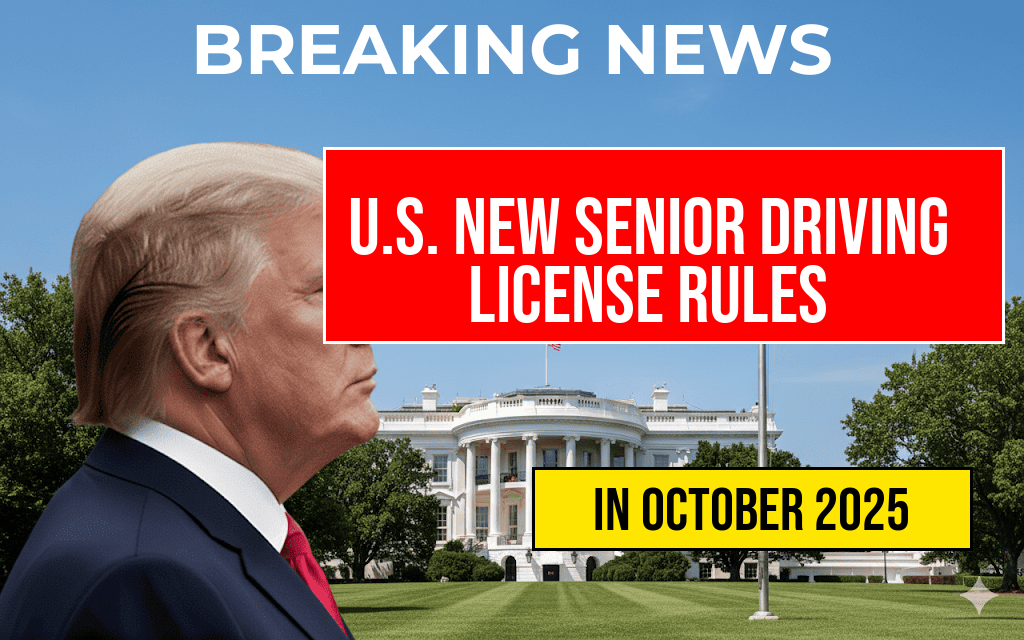Starting October 2025, the United States will introduce comprehensive updates to the driving license regulations for seniors, particularly those aged 70 and older. These new standards aim to enhance road safety while accommodating the evolving needs of older drivers. Key changes include more frequent license renewal processes, mandatory vision and health assessments, and updated testing protocols designed to better evaluate driving competence. The initiative responds to demographic shifts, as the population of licensed drivers over 70 continues to grow, reflecting increased longevity and improved health among seniors. State agencies are working in tandem with transportation officials and healthcare providers to implement these modifications smoothly, ensuring that qualified seniors retain their driving privileges without compromising safety. This article outlines the essential updates, the rationale behind the reforms, and what seniors can expect as the new regulations take effect.
Background and Rationale for New Regulations
The decision to overhaul licensing requirements for seniors stems from data indicating a rise in age-related medical conditions that can impact driving ability, such as vision impairments, cognitive decline, and slower reaction times. According to the Insurance Institute for Highway Safety (IIHS), older drivers are involved in fewer accidents overall but tend to experience more severe consequences when accidents occur. As the population of Americans over 70 surpasses 50 million, policymakers aim to balance individual mobility with public safety, prompting reforms that emphasize proactive assessment rather than reactive restrictions.
Key Changes in Licensing Procedures
More Frequent License Renewals
- Older drivers will now need to renew their licenses every two years instead of the current five-year cycle.
- This increased frequency is intended to facilitate regular health and vision evaluations, ensuring drivers remain fit behind the wheel.
Mandatory Vision and Health Assessments
- All applicants over 70 will undergo comprehensive vision tests at designated testing centers or approved healthcare providers.
- Participants will also be required to submit health documentation, including assessments for cognitive function and mobility, from licensed medical professionals.
Enhanced Road Testing Protocols
- Applicants may be asked to complete practical driving examinations tailored to detect age-related impairments.
- Advanced simulators and on-road evaluations will be used to assess reaction times, decision-making, and vehicle control.
Implementation Timeline and State-Level Variations
The new regulations are set to roll out nationwide starting October 2025, with states responsible for adapting these directives to their existing licensing frameworks. While federal guidelines establish the overall framework, individual states may introduce supplementary measures or resources to support seniors during the transition. For instance, some states might offer free or subsidized vision screenings or expanded educational programs on safe driving practices for older adults.
States such as California, New York, and Florida, which have the highest populations of senior drivers, are already mobilizing efforts to inform residents about upcoming changes. The Department of Motor Vehicles (DMV) websites are expected to host detailed guidance, including appointment scheduling and documentation requirements.
Impact on Seniors and Public Safety
Advocates argue that these regulations will help maintain the independence of older drivers while reducing the risk of accidents linked to age-related health issues. Senior advocacy groups emphasize the importance of fair and accessible testing procedures, ensuring that capable drivers are not unfairly burdened. Conversely, some seniors express concerns about increased testing frequency and potential delays in license renewal, underscoring the need for streamlined processes and supportive resources.
| Requirement | Before October 2025 | Starting October 2025 |
|---|---|---|
| Renewal cycle | Every 5 years | Every 2 years |
| Vision assessment | Not mandatory | Mandatory at renewal |
| Health documentation | Not required | Required for applicants over 70 |
| Driving test | Optional for renewal | Likely required or assessed via simulator |
Resources and Support for Senior Drivers
Recognizing the importance of mobility for seniors, several organizations are preparing to assist with the transition. The National Institute on Aging recommends regular health check-ups and offers tips on safe driving practices. Additionally, many states are expanding access to driver refresher courses and vision clinics designed specifically for older adults, aiming to improve skills and confidence behind the wheel.
Healthcare providers are also being encouraged to discuss driving safety during routine check-ups, providing personalized assessments that consider medical history and current health status. This collaborative approach aims to uphold the independence and safety of seniors navigating a complex roadway environment.
Looking Ahead
The new regulations, set to begin in October 2025, mark a significant shift toward more proactive management of senior driver licensing. As states prepare for implementation, ongoing public education and accessible resources will be crucial in ensuring that older drivers understand and adapt to the changes. These updates aim to preserve mobility while prioritizing safety, reflecting a broader commitment to responsible aging and transportation policy across the nation.
Frequently Asked Questions
What are the new driving license regulations for seniors starting October 2025?
Beginning October 2025, drivers over 70 will need to adhere to updated driving license regulations that may include additional medical evaluations, vision tests, and renewal procedures to ensure safety on the roads.
Who is affected by the new driving license regulations for seniors?
The new regulations primarily apply to drivers aged 70 and older, aiming to enhance safety and ensure that senior drivers maintain competency and health standards necessary for safe driving.
What documents or assessments will seniors need to provide during license renewal?
Seniors will be required to submit medical reports, pass vision tests, and possibly undergo driving skills evaluations as part of the renewal process to verify their fitness to drive.
Will there be any exemptions or special considerations for seniors with health issues?
Yes, exemptions or special accommodations may be available for seniors with certain health conditions. These individuals might need to provide additional medical documentation and could be subject to more frequent evaluations.
How can seniors prepare for the upcoming changes to driving license regulations?
Seniors should schedule vision and health checkups in advance, stay informed about renewal requirements, and consider refresher driving courses to ensure a smooth transition and continued road safety.







